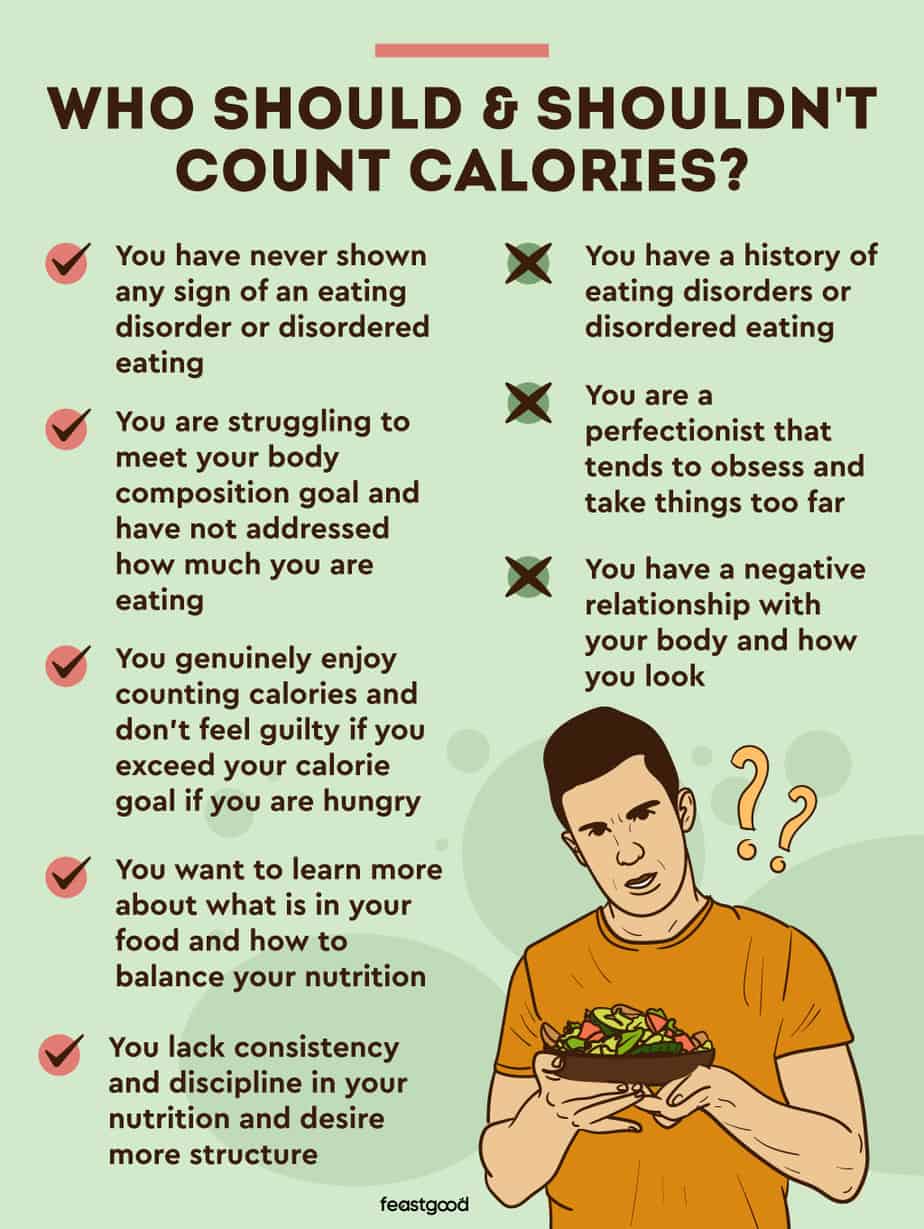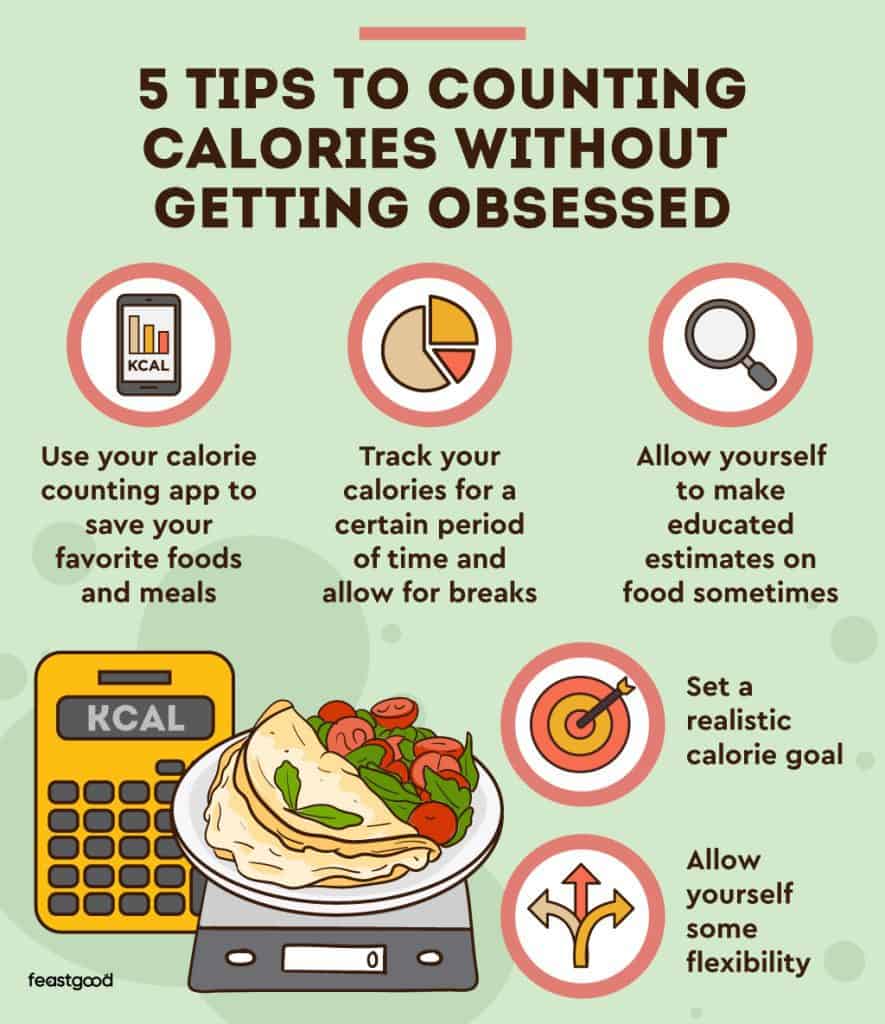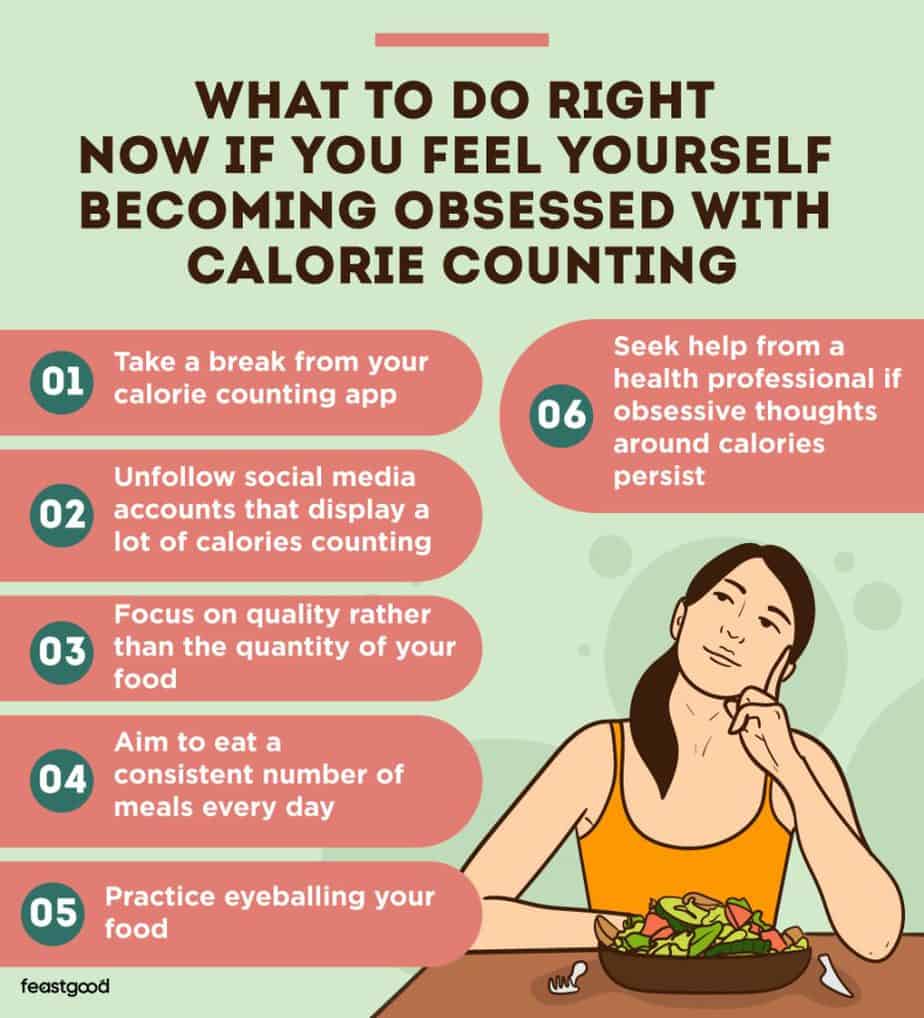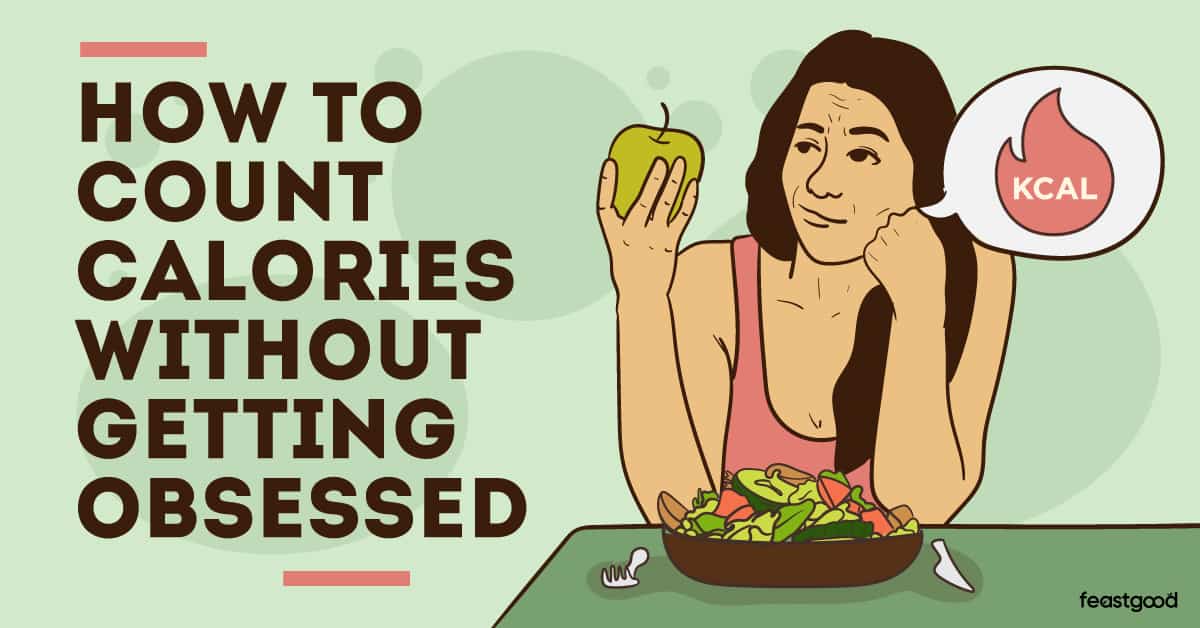While counting calories can be a helpful tool, it can sometimes result in an individual becoming consumed with the practice, which can create an unhealthy relationship with food.
If you obsess over counting calories to the point where it is harmful to your mental health, rest assured there are other methods you can use to reach your goals.
Tools such as eyeballing portion sizes, being flexible, and taking tracking breaks will help to ensure you don’t become obsessed with tracking calories.
I’ll cover each of these in further detail below, plus provide tips on what to do right now if you feel yourself becoming obsessed with calorie tracking.
Disclaimer: Although counting calories can help you to learn the calorie and macro content of your favorite foods, for certain individuals counting calories can create a very unhealthy relationship with food, which can potentially trigger or cause various eating disorders. Please seek qualified medical advice before starting any calorie counting process.
Check out our complete guide on How To Track Your Macros.
Who Should & Shouldn’t Count Calories?

If you are thinking about counting calories, it is very important to first establish whether you are someone who would benefit from this practice, or whether you would be better off without it.
Who Should NOT Count Calories
You should not count calories if you can relate to any of the following:
- You have a history of eating disorders or disordered eating
- You are a perfectionist that tends to obsess and take things too far
- You have a negative relationship with your body and how you look
1. You Have a History of Eating Disorders or Disordered Eating
If you are somebody who has, or is currently struggling with eating disorders, it is highly advised that you steer clear of calorie counting. Whether you have struggled with eating disorders like anorexia, bulimia, or binge eating disorders, research shows that calorie counting will only exacerbate these conditions.
One eating disorder in particular that is seen quite commonly with individuals who obsess over their calorie intake is orthorexia. Orthorexia is an eating disorder where one will fixate so heavily on the purity and amount of food that they eat, to the point where it will negatively affect their overall health and well-being.
If someone is battling with orthorexia, some common symptoms are:
- High levels of concern about food quality
- Complete avoidance of numerous foods, particularly anything deemed “unhealthy”
- Food obsession that interferes with social outings and time spent with friends
- Fear of losing control around food intake
- Depression and/ or mood changes
- Drastic weight loss
If you or anyone that you know is struggling with orthorexia or any other type of eating disorder, seeking help through your doctor or an eating disorder specialist is advised.
- Related Article: I Ate 2000 Calories Over My Limit – What To Do Now
2. You Are a Perfectionist That Tends To Obsess and Take Things Too Far
If you or those around you consider you a “perfectionist”, then the practice of tracking your calories might end up being detrimental for you. In severe cases, perfectionism has been linked to mental health issues like obsessive compulsive disorder (OCD), which can severely impact overall quality of life if not treated.
In the practice of calorie counting, it is so important to not strive to be meticulous, and instead allow for imperfection and mistakes in order to maintain a healthy relationship with food.
If you have the type of personality that cannot be satisfied unless things are absolutely perfect, even at the expense of your own mental health, then calorie counting is not the practice for you.
- Related Article: Should You Undereat After Overeating? (Here’s What To Do)
3. You Have a Negative Relationship With Your Body and How You Look
When you have a negative relationship with your body and the way that it looks, then counting your calories can also end up having a negative connotation to it.
Anytime you are looking to change your body composition, it is important to evaluate your “why”, and what is fuelling your desire for transformation.
If you are trying to track your calories from a place of hate for your body, this is much different than if you are counting calories and shifting body composition strictly to challenge yourself and hit a goal.
I always like to say to my clients that “you cannot hate yourself healthy”, and by this, I mean that focusing on your calories will not change how you feel about yourself and won’t mend any deep-rooted self-esteem issues that you battle.
If you are someone who struggles with self-image and body confidence, it is highly advised that you address this mental pattern and heal your relationship with yourself before you embark on a calorie counting journey.
If you are tracking your calories from a place of self-love, you are much more likely to have success.
Who SHOULD Count Calories
There are certain people who are going to be able to benefit from calorie counting without any of the negative consequences.
You may benefit from counting calories if you can relate to the following:
- You have never shown any sign of an eating disorder or disordered eating
- You are struggling to meet your body composition goal and have not addressed how much you are eating
- You genuinely enjoy counting calories and don’t feel guilty if you exceed your calorie goal if you are hungry
- You want to learn more about what is in your food and how to balance your nutrition
- You lack consistency and discipline in your nutrition and desire more structure
1. You Have Never Shown Any Sign of an Eating Disorder or Disordered Eating
If you are someone who can sincerely say that they have never struggled with a negative relationship with food, or any sort of eating disorder, then tracking calories will not pose the same risks in comparison to someone who has.
With that said, it is important to note that even if you are not somebody who has never struggled with an unhealthy relationship with food, calorie tracking can potentially trigger disordered eating patterns in individuals who had never previously experienced this behavior.
Even if it has never been an issue previously, if you begin to notice signs of disordered eating or an eating disorder after tracking your calories, it is advised that you stop tracking your calories immediately and seek help from a health professional if needed.
2. You Are Struggling To Meet Your Body Composition Goal and Have Not Addressed How Much You Are Eating
If you are looking to change your body composition, you may have adopted habits such as working out regularly, along with maybe eating less processed foods. While these are great steps to take, it may not be enough to meet your goal.
For anyone who has never dieted or tracked calories before, it can be easy to think you are eating the amount that you need to reach your goal, while in reality you might be eating drastically more (or less) than what your body needs.
If this sounds like you, it may be beneficial for you to track your calories for a period of time to see how many calories you are regularly consuming. From there, you will be able to adjust your calorie intake in order to meet your body composition goal.
3. You Genuinely Enjoy Counting Calories and Don’t Feel Guilty if You Exceed Your Calorie Goal if You Are Hungry
For certain people, tracking calorie intake can be more of a hobby than a chore, and some people can find joy in hitting their macros and calories and nailing their workouts. If this is the case for you, then calorie counting can be a perfectly healthy practice that you include in your daily activities.
If you find it enjoyable to count your calories, this is perfectly healthy provided that you allow yourself to stray now and again in order to listen to your body. If you can easily go over your calorie count on certain days that you feel hungrier without feeling any guilt, this is a sign that you are a good fit for calorie counting.
4. You Want To Learn More About What Is in Your Food and How To Balance Your Nutrition
It is very common for individuals that are beginning their health and fitness journey to have a poor understanding of what is in their food, along with what a properly balanced meal looks like.
In these types of situations, it can be very beneficial for you to track calories and macros for a period of time in order to develop a greater understanding of what you are eating.
This can not only help to ensure that you are not only eating the proper amount of calories for your body, but that you are also eating a balanced amount of protein, carbohydrates and fat.
5. You Lack Consistency and Discipline in Your Nutrition and Desire More Structure
While we have established that too much perfectionism within a personality can be a negative thing, having no consistency or discipline whatsoever can be equally as destructive. Lacking any sort of regulation when it comes to your diet and exercise can lead to poor physical and mental health.
If you find yourself on the opposite end of the perfectionist scale, then the structure of calorie counting could be a great way for you to develop some consistent healthy habits and transform you into somebody who has a healthy amount of discipline in their life.
5 Tips to Counting Calories Without Getting Obsessed

If you want to count your calories in order to reach your goals, there are ways to go about it that won’t result in you becoming obsessed.
- Set a realistic calorie goal
- Allow yourself some flexibility
- Allow yourself to make educated estimates on food sometimes
- Use your calorie counting app to save your favorite foods and meals
- Track your calories for a certain period of time and allow for breaks
1. Set a Realistic Calorie Goal
Setting a reasonable calorie goal to hit will have a big impact on whether or not you can maintain a happy and healthy relationship with calorie counting. If you do not set a calorie goal that is suitable for you, it can set you up for failure, which could encourage an unhealthy relationship with tracking.
For example, if we take an active 25-year-old woman who is 5’4” tall and 135 pounds, she should be eating roughly 1967 to maintain her weight, and 1717 calories for healthy weight loss, according to this TDEE calculator.
If this woman was to drastically reduce her caloric goal to 1200 calories per day, not only would she find it extremely difficult to hit this goal without going over, but she could end up losing control around food or developing binge eating patterns. This type of behavior will only worsen her relationship with calorie counting.
When you are setting your calorie goal, make sure that it is a reasonable number that you can maintain on a consistent basis, based on your Total Daily Energy Expenditure.
- Related Article: I Burned More Calories Than I Ate & Still Gained Weight (Why)
2. Allow Yourself Some Flexibility
In order to avoid any perfectionist type behavior, it is important to allow yourself to have some flexibility with your calorie goal, rather than trying to hit an exact number every single day.
For example, if the woman above was aiming to eat exactly 1717 calories every single day in order to lose weight, it would be easy to become very obsessive. Hitting such a precise number on a daily basis would require her plan and count very carefully every single bit of food that she eats.
On the other hand, if she were to allow herself a rough calorie range to aim for, such as 1650-1800 calories, she would still be very close to her daily calorie goal, while taking the pressure off of herself to hit her calorie count perfectly.
3. Allow Yourself To Make Educated Estimates on Food Sometimes
It is common for situations to arise while calorie counting where you may not have access to your food scale or the normal foods that you eat. Examples of this might be eating at a restaurant or going to a friend’s house for dinner.
If you find yourself in a situation like this, rather than freaking out about tracking flawlessly, roughly estimate how much food you are eating or the types of ingredients in a meal, so you get an idea of how many calories that you consumed.
For example, if you are over at a friend’s house for a BBQ and eat a cheeseburger, you can get an idea of how many calories you ate without a food scale. You can simply estimate the weight of the burger, the amount of condiments that you used, and the generic burger bun.
Estimating the calorie count of a cheeseburger on MacroFactor (my favorite calorie tracking app) comes out to:
- 5oz beef burger patty (80%) lean- 384 calories
- 1 Cheddar cheese slice- 113 calories
- 1 tbsp ketchup- 19 calories
- 1 burger bun – 140 calories
- TOTAL= 656 calories
The example above demonstrates that using rough estimates when you do not have access to your normal calorie counting tools can still provide you with an accurate calorie count, while also allowing you to enjoy social engagements with food.
4. Use Your Calorie Counting App To Save Your Favorite Foods and Meals
For many people, there are certain meals that you might eat frequently, either out of habit, enjoyment, or convenience. For example, while it is common practice to rotate your meal at dinner, it is also very common for people to gravitate toward the same breakfast meal every single day.
If you find that there are certain meals that you eat on a regular basis, you can try saving these meals in your calorie counting app and eyeballing the portions that you normally use instead of painstakingly weighing every single ingredient on a scale and logging them separately.
This simple change will reduce the amount of time that you have to spend in the practice of calorie counting and allow you to experience more freedom with your food.
- Related: How To Count Calories In Homemade Food: 2 EASY Methods
5. Track Your Calories for Only a Certain Period of Time and Allow for Breaks
While tracking your calories can be an extremely beneficial tool when working toward a body composition goal, it is not a practice that is meant to be practiced every single day for the rest of your life.
For this reason, it is recommended to track your calories for a period of time but allow for diet breaks in between periods of calorie counting. During these breaks, you can tune into your body’s natural hunger cues, and enjoy more food freedom which will help to improve your relationship with food.
You do not ever want calorie counting to feel like a prison, and for this reason, it is critical that you take time away from the practice. The tips that are mentioned above are also great options for those that simply need a break from calorie counting but intend on using it again in the future.
- Related Article: How Can “Apple Shape” Bodies Lose Weight (Step By Step Guide)
What To Do Right Now If You Feel Yourself Becoming Obsessed with Calorie Counting

If you have been counting your calories and have noticed that the practice is consuming you in a harmful way, there are steps that you can take to unravel yourself from the obsession. Below I am going to go over some action steps that you can take to step back from calorie counting if it has become unhealthy.
1. Take a Break From Your Calorie Counting App
If calorie counting is consuming you, one of the first things that you should do is delete your calorie counting app and stop logging your food.
While this may be difficult, this is an important step as it will allow you to take your focus off of how much you are eating and allow you to focus on your relationship with food instead.
2. Unfollow Social Media Accounts That Display a Lot of Calories Counting
Social media can be a place where you can find a lot of motivation and inspiration, but it can also promote unhealthy comparison and intensify the pressure for perfection if you are not in a healthy mind space.
If you are struggling with feeling obsessed over calorie counting, try unfollowing any social media accounts that promote lots of calorie counting, and follow accounts that promote practices such as intuitive eating instead.
3. Focus on Quality Rather Than the Quantity of Your Food
Going from constantly tracking your calorie intake, to not tracking at all can feel slightly overwhelming. One helpful practice is to focus on eating high quality, nutrient dense foods, and eating until you are comfortably satiated.
When you eat whole foods, you are typically going to be choosing things without a nutrition label. For example, a pint of strawberries or a bag of sweet potatoes will not have the calorie count listed on them the same way that a protein bar or shake does. This can be helpful when you are trying to steer clear of calorie counting.
4. Aim To Eat a Consistent Number of Meals Every Day
When you are counting calories, it is common to feel like you have a lot of structure in your diet, and when that is taken away, it can feel uncomfortable for certain people.
In these types of situations, I recommend implementing light structure into your daily routine by focusing on consuming a consistent number of meals every day. This repetitive action will help you to feel like you are
Whether you decide to eat 6 meals a day or 3 meals, having this consistency will allow you to let go of tracking calories with less difficulty.
5. Practice Eyeballing Your Food
If you have been tracking calories for a long period of time, you likely have a pretty good idea of how many calories are in your favorite foods, along with how much you need.
Using this skill to eyeball your food in order to determine your portions will further help you to let go of weighing your food and counting your calories.
6. Seek Help From a Health Professional if Obsessive Thoughts Around Calories Persist
It is very important to be honest with yourself if you feel like your obsession toward counting calories has caused or is contributing to any disordered eating habits or an eating disorder.
If this is the case, there are treatments that are available that will allow you to regain a healthy relationship with food. It is absolutely possible to experience food freedom while reaching your body composition goals.
If you are struggling with an obsessive relationship with counting calories, speak with your doctor and seek professional treatment.
What To Read Next
- Gaining Muscle Without Counting Calories or Macros (7 Tips)
- How Many Calories Do You Need To Maintain Your Weight?
- Going Over Your Calories Once A Week: Is This Okay?
- Is It Bad To Go Over Your Fat Macros?
- Is It Bad To Go Over Your Carb Macros?
- Do Macros Matter for Bulking? (Yes, Here’s Why)
Reference
Simpson CC, Mazzeo SE. Calorie counting and fitness tracking technology: Associations with eating disorder symptomatology. Eat Behav. 2017 Aug;26:89-92. doi: 10.1016/j.eatbeh.2017.02.002. Epub 2017 Feb 9. PMID: 28214452.
About The Author

Colby Roy is a holistic health and nutrition coach. She is certified through Precision Nutrition and has a passion for all things nutrition and healing the body. More specifically, Colby likes to work with clients who want to optimize their gut health and energy levels.
Why Trust Our Content

On Staff at FeastGood.com, we have Registered Dietitians, coaches with PhDs in Human Nutrition, and internationally ranked athletes who contribute to our editorial process. This includes research, writing, editing, fact-checking, and product testing/reviews. At a bare minimum, all authors must be certified nutrition coaches by either the National Academy of Sports Medicine, International Sport Sciences Association, or Precision Nutrition. Learn more about our team here.
Have a Question?
If you have any questions or feedback about what you’ve read, you can reach out to us at [email protected]. We respond to every email within 1 business day.

